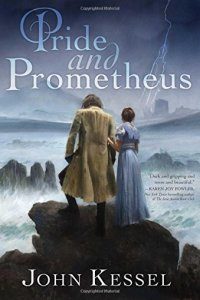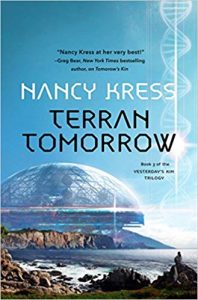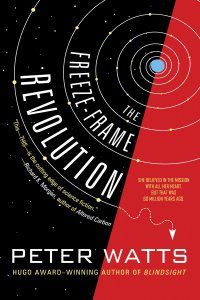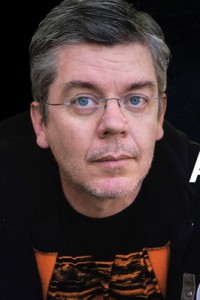2018: The Triumph of “Only Different” by Russell Letson

It’s the most summarizing time of the year, and I’ve been at it long enough that I’m tempted to just summarize my old summaries, looking for meta-trends or shapes in the clouds (very like a camel, indeed) that impose order on the squirming facts of a field that is neither singular nor unified but (to plagiarize myself from a quarter-century ago) “a set of fields with readerships that only occasionally overlap.”
But that would be cheating. What I am struck by (again) is how, after reading all over those overlapping fields for six decades, I still find books that don’t strike me as mere rehashings of familiar patterns and tropes – or, to be precise, I find books that make those familiar patterns and tropes worth yet another go-round. That, I maintain, is one of the crucial jobs of Art in general: to navigate the tricky waters of The Same Only Different (TSOD). Not that there’s anything wrong with The Same Every Time (TSET). As I write this, people are snuggling up on the sofa to rewatch It’s a Wonderful Life, A Christmas Story, Miracle on 34th Street, and The Muppet Christmas Carol for the nth time, so TSET clearly has some appeal. Stream it again, Sam. But whatever onward-marching Art does, it’s the result of the Only Different half of the formula.
 Perhaps the most striking and ingenious example of Only Different I encountered this year was John Kessel’s collision of Jane Austen and Mary Shelley in Pride and Prometheus, which treats its received material in a manner that is simultaneously serious and playful, and not-just-a-stunt. (Though as a piece of literary stuntwork it is a doozy). Many of the now-fashionable Austen retreads and revivals and mashups amount to a kind of literary cosplay, which is not what Kessel is about here. Instead, like many another historical novelist (for that category is as applicable as SF or the fantastic in this case), he is rummaging around in and rubbing together our ideas about the past and its ideas about itself, which is what SF does in the opposite direction.
Perhaps the most striking and ingenious example of Only Different I encountered this year was John Kessel’s collision of Jane Austen and Mary Shelley in Pride and Prometheus, which treats its received material in a manner that is simultaneously serious and playful, and not-just-a-stunt. (Though as a piece of literary stuntwork it is a doozy). Many of the now-fashionable Austen retreads and revivals and mashups amount to a kind of literary cosplay, which is not what Kessel is about here. Instead, like many another historical novelist (for that category is as applicable as SF or the fantastic in this case), he is rummaging around in and rubbing together our ideas about the past and its ideas about itself, which is what SF does in the opposite direction.
C.J. Cherryh’s Foreigner series stretches its Same/Different along another axis: the anxieties and puzzlements of the encounter with Others who are both like and unlike us and whom we need to understand, lest everything blow up in our collective faces. Her protagonist, Bren Cameron, has spent 19 volumes struggling to make sense of an alien culture, which has also meant making sense of humankind, and in Emergence he finds himself wrangling the political-cultural-emotional oddities of his own species more than those of his alien employers. Since there are 18 previous books, there is plenty of The Same here (and Cherryh’s readers clearly love that side of the series – as I do), but Only Different is always and simultaneously present, not only in the alien-human frictions but in the ingenious ways that Cherryh manages to generate variations on the books’ givens and tensions.
 Indeed, a series (like episodic television) is necessarily about TSOD, whether The Same consists of a common background or dramatis personae or story pattern. And cultivating and expanding the Only Different part is what separates the best SF/F from ordinary extruded fantastic-adventure product. Nancy Kress has made a specialty of using sequels and trilogies to devise problems and solutions, only to turn the solutions into further problems – of refusing to settle for final answers to questions that evade finality. If Tomorrow Comes and Terran Tomorrow supply the conventional middle and last volumes to the trio that began with last year’s Tomorrow’s Kin, and, even more than is usual in a Kress series, they defy the final-curtain feeling that the number three is supposed to supply – presumably because humans are not going to stop falling on their faces no matter how many times they get up off the floor or make a timely getaway on a starship.
Indeed, a series (like episodic television) is necessarily about TSOD, whether The Same consists of a common background or dramatis personae or story pattern. And cultivating and expanding the Only Different part is what separates the best SF/F from ordinary extruded fantastic-adventure product. Nancy Kress has made a specialty of using sequels and trilogies to devise problems and solutions, only to turn the solutions into further problems – of refusing to settle for final answers to questions that evade finality. If Tomorrow Comes and Terran Tomorrow supply the conventional middle and last volumes to the trio that began with last year’s Tomorrow’s Kin, and, even more than is usual in a Kress series, they defy the final-curtain feeling that the number three is supposed to supply – presumably because humans are not going to stop falling on their faces no matter how many times they get up off the floor or make a timely getaway on a starship.
 Walter Jon Williams is doing something similar in The Accidental War, while also exploiting the possibilities of his Praxis universe. This version of “and then what?” is not unrelated to Kress’s reluctance to land on final answers, but is perhaps thanks to the story possibilities left open by earlier books and a very roomy setting. Meanwhile, Jack McDevitt has been adding to both ends of the long career of starship pilot Priscilla Hutchins. Having established her origin story in a recent novel and several short pieces, he brings her out of retirement in The Long Sunset to cope with one of the series’ slow-cooking themes, the inward turn away from the stars. And, of course, a great, sprawling future history is its own reason for being, a Nivenian playground in which to set all manner of stories. Alastair Reynolds’ Elysium Fire is part of a series-within-a-series, a police procedural tucked into one corner of a busy, gaudy future history extensive enough to host space operas, Stapledonian wonderfests, and murder mysteries.
Walter Jon Williams is doing something similar in The Accidental War, while also exploiting the possibilities of his Praxis universe. This version of “and then what?” is not unrelated to Kress’s reluctance to land on final answers, but is perhaps thanks to the story possibilities left open by earlier books and a very roomy setting. Meanwhile, Jack McDevitt has been adding to both ends of the long career of starship pilot Priscilla Hutchins. Having established her origin story in a recent novel and several short pieces, he brings her out of retirement in The Long Sunset to cope with one of the series’ slow-cooking themes, the inward turn away from the stars. And, of course, a great, sprawling future history is its own reason for being, a Nivenian playground in which to set all manner of stories. Alastair Reynolds’ Elysium Fire is part of a series-within-a-series, a police procedural tucked into one corner of a busy, gaudy future history extensive enough to host space operas, Stapledonian wonderfests, and murder mysteries.
Speaking of genre cross-pollination, in One Way S.J. Morden has come up with another approach to combining the murder mystery and SF, specifically the planetary-pioneering/exploring category, with a side helping of nasty-business machinations – the illegitimate great-grandchild of “The Man Who Sold the Moon”. And the solving of the novel’s mystery was not a complete resolution, as signaled by a listing for what looks like a sequel later this year.
Then there is extension by theme-and-variations. One of Neal Asher’s consistent themes is predation, and the variations he rings on it are elaborate and often lurid. In The Soldier, he once again resurrects a supposedly extinct killing machine and sets it loose on the cast and standing sets of his Polity universe of nature-red-in-tooth-and-claw, with predictably dire results; at the same time supplying more details of a galactic-history back-story. Both of Charles Stross’s 2018 series entries show a similar fascination with going deeper into their particular direnesses. Dark State is an elaboration and exploration of implications of the Merchant Princes series’ generating Ideas, both general-intellectual (about economics and politics) and genre (the confluence of the alternate-history and espionage/thriller categories). The Labyrinth Index continues with the Laundry series’ project of genre-mixing and horror-comedy, a continuing, um, horrified fascination with how current events and tendencies can be mirrored in an “entertainment.”
 It’s not exactly breaking news, but the return of the novella and the short novel offers a break from doorstop volumes that stress out reviewers who have monthly deadlines. What was once a magazine feature, the complete-in-this-issue “novel” (back when 60K words was enough to fill out a mass-market paperback) is on offer from small presses and online sources such as Tor.com. Karl Schroeder’s The Million could have fit into that 1960s paperback form factor and milieu, with its comic-inferno world and youngsters-against-the-establishment plot, though it is carried out with a distinctly 21st-century technological élan. The density and strangeness of the world of Greg Egan’s Phoresis, though, would have given a twenty-year-old me a lot of trouble – it’s as though Olaf Stapledon were to drop the reader directly into an exotic alien world without benefit of explanatory narrator, footnote, or infodump. This is a very deep Only Different, and it’s sink or swim. (I swam.) Peter Watts’s The Freeze-Frame Revolution is another once-familiar form, a section of a large-scale story that is being built out of shorter semi-independent episodes. It is all apparently going to fit together to make something Uncle Olaf might have designed, had he a bit more taste for individual characterization and melodrama.
It’s not exactly breaking news, but the return of the novella and the short novel offers a break from doorstop volumes that stress out reviewers who have monthly deadlines. What was once a magazine feature, the complete-in-this-issue “novel” (back when 60K words was enough to fill out a mass-market paperback) is on offer from small presses and online sources such as Tor.com. Karl Schroeder’s The Million could have fit into that 1960s paperback form factor and milieu, with its comic-inferno world and youngsters-against-the-establishment plot, though it is carried out with a distinctly 21st-century technological élan. The density and strangeness of the world of Greg Egan’s Phoresis, though, would have given a twenty-year-old me a lot of trouble – it’s as though Olaf Stapledon were to drop the reader directly into an exotic alien world without benefit of explanatory narrator, footnote, or infodump. This is a very deep Only Different, and it’s sink or swim. (I swam.) Peter Watts’s The Freeze-Frame Revolution is another once-familiar form, a section of a large-scale story that is being built out of shorter semi-independent episodes. It is all apparently going to fit together to make something Uncle Olaf might have designed, had he a bit more taste for individual characterization and melodrama.
Chasing after novels makes it hard to keep up with short stories and novelettes as they appear in their usual environments, but two anthologies provided samples of that end of SF and assured me that the field (oh, all right, the set of fields) continues to be as inventive as ever. Neil Clarke’s The Final Frontier draws on the last decade and Jonathan Strahan’s all-originals Infinity’s End is up-to-the-minute, and both demonstrate that Only Different continues to drive established writers and newcomers alike.
A shortlist (arbitrarily limited to novels):
Neal Asher, The Soldier
C.J. Cherryh, Emergence
John Kessel, Pride and Prometheus
Nancy Kress, If Tomorrow Comes and Terran Tomorrow
S.J. Morden, One Way
Charles Stross, Dark State
Walter Jon Williams, The Accidental War
Russell Letson, Contributing Editor, is a not-quite-retired freelance writer living in St. Cloud, Minnesota. He has been loitering around the SF world since childhood and been writing about it since his long-ago grad school days. In between, he published a good bit of business-technology and music journalism. He is still working on a book about Hawaiian slack key guitar.
This and more like it in the February 2019 issue of Locus.
 While you are here, please take a moment to support Locus with a one-time or recurring donation. We rely on reader donations to keep the magazine and site going, and would like to keep the site paywall free, but WE NEED YOUR FINANCIAL SUPPORT to continue quality coverage of the science fiction and fantasy field.
While you are here, please take a moment to support Locus with a one-time or recurring donation. We rely on reader donations to keep the magazine and site going, and would like to keep the site paywall free, but WE NEED YOUR FINANCIAL SUPPORT to continue quality coverage of the science fiction and fantasy field.








